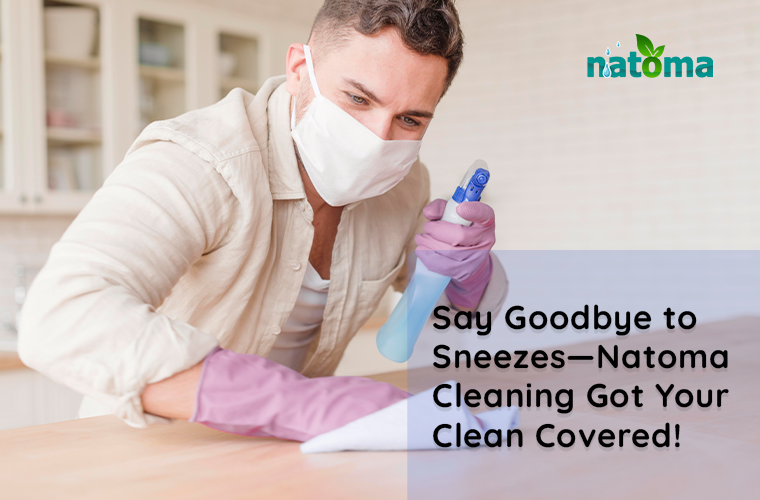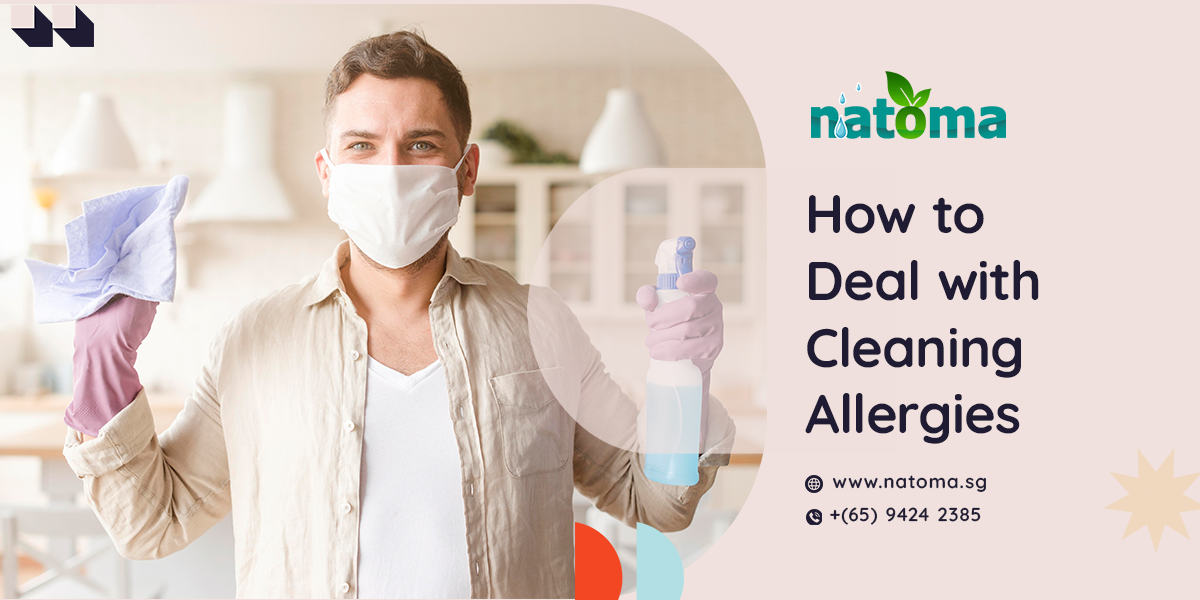Synopsis
Section No. | Heading |
1 | |
2 | |
3 | |
4 | |
5 | |
6 | |
7 | |
8 | |
9 | |
10 | |
11 | Say Goodbye to Sneezes—Natoma Cleaning Got Your Clean Covered! |
12 |
Introduction
Cleaning is a part of everyday life, but for some people, it can bring on a host of uncomfortable symptoms—sneezing, coughing, watery eyes, or even asthma attacks. Cleaning allergies can turn a healthy habit into a health hazard. Fortunately, there are practical steps you can take to deal with cleaning allergies without compromising on cleanliness. In this blog, we’ll explore the causes, symptoms, and solutions that can help you breathe easier while maintaining a spotless space. For businesses seeking safer cleaning environments, our Commercial Cleaning Service is tailored to allergy-sensitive needs.
What Are Cleaning Allergies?
Cleaning Allergies occur when your immune system reacts to certain chemicals or airborne particles typically found in cleaning products. These allergic reactions can range from mild irritations to severe respiratory problems.
Did You Know?
Allergies from cleaning are not always caused by dust; harsh chemicals and artificial fragrances are often the culprits.
Common Triggers in Cleaning Products
Some cleaning products contain substances that are common irritants or allergens, including:
Ammonia
Chlorine bleach
Synthetic fragrances
Formaldehyde
Aerosol propellants
These ingredients can irritate the skin, eyes, or lungs, especially in enclosed spaces with poor ventilation.
Symptoms of Cleaning Allergies
Symptoms vary depending on your sensitivity and exposure but often include:
Sneezing or runny nose
Watery or itchy eyes
Skin rashes or irritation
Shortness of breath
Coughing or wheezing
Recognizing these symptoms early can help you take steps to reduce exposure.
How to Identify Your Allergens
Identifying the exact substances that trigger your allergies can take some time. A combination of the following methods may help:
Keep a symptom diary noting what products were used before a reaction
Patch tests by dermatologists for skin allergies
Allergy testing by an allergist for respiratory triggers
Safe Cleaning Habits to Reduce Allergic Reactions
Even if you have cleaning allergies, you don’t have to give up on having a tidy space. Here are some habits that can make cleaning safer:
Always wear gloves and a mask
Keep the area well-ventilated while cleaning
Avoid mixing chemicals (e.g., bleach and ammonia)
Use a damp cloth to trap dust instead of spreading it
Clean regularly to prevent buildup of allergens
Choosing Allergy-Friendly Cleaning Products
Switch to products that are specifically labeled:
Fragrance-free
Dye-free
Hypoallergenic
Eco-friendly or plant-based
Pro Tip:
Check labels for certifications from allergy foundations or dermatological institutes.
Natural Alternatives for Cleaning
Natural cleaning ingredients are often less irritating and work just as effectively. Some great choices include:
Baking soda: A mild abrasive and deodorizer
White vinegar: Disinfects and breaks down grime
Lemon juice: Cuts grease and leaves a natural scent
Castile soap: Gentle and biodegradable
Mix these with water and essential oils (if you’re not allergic) for customized, non-toxic cleaning solutions.
Tips for Allergy-Proofing Your Home or Office
In hospitality settings like hotels, resorts, and serviced apartments, maintaining a clean environment is not just about appearance—it’s about guest comfort and health. If cleaning-related allergies become a concern, it’s time to bring in professionals.
Guests report frequent allergy-related discomfort.
Staff face exposure to allergens during routine cleaning.
The facility requires consistent use of hypoallergenic products.
Specialized equipment is needed for deep, allergen-reducing cleaning.
Hospitality Cleaning Challenges: When Allergies Strike
Small changes can make a big difference when it comes to minimizing allergens:
Use HEPA filters in vacuum cleaners and air purifiers
Wash linens in hot water weekly
Keep windows closed during high pollen seasons
Switch out carpeting for hard flooring where possible
Clean mold-prone areas (like bathrooms) regularly with natural products
A professional service that understands hospitality needs ensures that both guests and employees experience a safer, allergy-conscious environment.

Say Goodbye to Sneezes—Natoma Cleaning Got Your Clean Covered!
If allergies have made cleaning a nightmare, Natoma Cleaning Service is here to help. We understand the sensitivity some individuals face with traditional cleaning methods. That’s why we provide allergy-conscious cleaning options using non-toxic, fragrance-free products that are safe for homes, offices, children, and pets.
With trained professionals who follow strict hygiene protocols and use high-efficiency equipment, Natoma delivers a deep clean without the sneeze. Plus, our eco-friendly practices ensure minimal exposure to harsh chemicals. Whether it’s a routine home clean or a post-renovation job, we’ve got your comfort and safety in mind.
Conclusion
Cleaning should leave you refreshed, not reaching for tissues. If you or your loved ones suffer from cleaning allergies, understanding the triggers and switching to safer methods can make a world of difference. From choosing hypoallergenic products to relying on trusted professionals like Natoma Cleaning Service, there are many ways to maintain a spotless space without the sneezes.
A clean home or office is important — but your health comes first. Take action today to allergy-proof your cleaning routine and breathe easier tomorrow.

